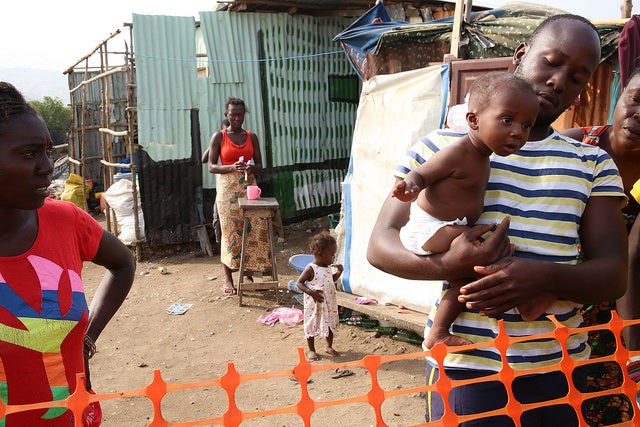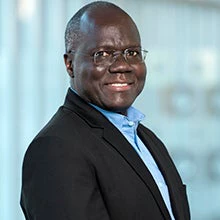
in Abredeen, Car Town a neighborhood within Freetown, Sierra Leone on March 13, 2015.
UNFPA and the WHO have been working closely with these neighbors to stop more
infections of Ebola in their neighborhood. Photo © Dominic Chavez/World Bank
In February 2015, my village of Homa Bay County in Kenya experienced a cholera outbreak, claiming the lives of 17 people and affecting nearly 700 others. It was not our first cholera outbreak but it took a devastating toll, not just in my village but in nearby communities, too. As an epidemiologist and a public health professional, I was struck at the lack of capacity to rapidly detect the outbreak and contain its spread. Cholera’s symptoms are generally well understood making it easier to diagnose and treat than many diseases, but even still it took a deadly toll.
It was during this same time that an Ebola outbreak was wreaking havoc in West Africa, where eventually the disease would kill 11,000 people and destroy the lives of countless others. But some of the reasons the disease wasn’t stopped sooner were the same as in the cholera outbreak: limited laboratories; weak surveillance systems and insufficient human resources .
Over the past decade, infectious diseases like Ebola, Middle East Respiratory Syndrome (MERS), avian influenza and, more recently, Zika, have demonstrated the ability of pandemics to devastate communities through both extraordinary losses of life and severe socio-economic impacts. In 2008, the World Bank estimated that a severe flu pandemic could result in $3 trillion in global economic losses, equivalent to 4.8% of gross domestic product (GDP). Last year, the World Bank also published a report estimating that the three Ebola-affected countries of Guinea, Liberia, and Sierra Leone will lose at least US$2.2 billion in forgone economic growth in 2015 as a result of the epidemic.
A major lesson from the Ebola epidemic is that the world must be better prepared and respond much quicker to future disease outbreaks. In May 2015, the UN Secretary-General appointed a High Level Panel on Global Response to Health Crises. In its final report, the panel highlighted the need for simulated exercises to help strengthen and improve national and regional level preparedness planning when dealing with pandemics. While there is a rich experience of simulations related to security threats and humanitarian disasters, exercises related to infectious disease outbreaks and pandemics have been limited.
The very nature of global health is fast-moving. Stakes couldn’t be higher when lives are at risk. And often times we find ourselves too entrenched in a current crisis to carve out the needed time and resources to plan for future scenarios. But if we are to break this cycle of moving from one emergency to the next, more future planning is exactly what’s needed.
To make the case directly to key decision makers, the World Bank Group is working with Bill and Melinda Gates Foundation, to conduct the first set of pandemic simulation exercises that are designed to recreate a disease outbreak scenario to provoke a robust discussion about pandemic preparedness among policymakers. President Jim Yong Kim, Bill Gates and Chancellor Angela Merkel of Germany will jointly host simulation exercises on pandemic preparedness for the Heads of State and private sector leaders during the next World Economic Forum in Davos in January 2017 and the G-20 Heads of State meeting in July 2017. In preparation for the two major events, the World Bank will collaborate with the technical team from WHO, WEF and the German government to conduct similar exercises for G20 technical staff and and G20 Ministers of Health. Simulation exercises help make a theoretical possibility real, by allowing policymakers to role-play and map out gaps and concrete solutions to those gaps along with their peers.
During the World Bank/IMF Annual Meetings, the first-ever Simulation Exercise on Pandemic Preparedness was held for Ministers of Finance from selected countries which receive funds from IDA, the Bank’s fund for the poorest countries. Several countries were represented at the meeting including: Bangladesh, Cote d’Ivoire, Ethiopia, Ghana, Guinea, Guinea Bissau, Mozambique, Nigeria, Senegal, Sierra Leone, Trinidad and Tobago. The Ministers had a directed discussion framed by two videos which showcased a fictional country which is first in the early stages of a disease outbreak and then in the midst of a severe outbreak several months later. What could have been done differently to prevent the latter, how early and in what ways should Ministers of Finance engage, and is their country prepared with the right systems in the face of such situation
The meeting underscored the serious socio-economic impacts of pandemics and the need for constant coordination across all government ministries especially during the early stages of the outbreak.
And while the Ministers represented a wide range of cultural, geographic, and economic contexts, they shared many of the same concerns and recommendations:
- There must be close coordination between the ministries of finance, health, and agriculture, to define clearly what aspects of pandemic preparedness should be financed domestically, how to finance them, and how much it would cost. Governments should also have an efficient and quick process for reallocating national budgets to facilitate pandemic response.
- Introduction of a waiver—for example - special provisions for emergency procurements , use of pharmaceuticals or vaccines that may not be registered in the country, critical human resource including international medical teams who may not have work permits; and procurement of goods and services
- Countries need to establish a contingency fund, as part of it pandemic or disaster preparedness plan, which can be drawn upon whenever there is a serious outbreak. To complement the contingency fund, countries should also establish reserve funds for emergency purposes.
- To minimize impacts on the most strategic sectors of the economy—for example mining, agriculture, tourism—countries need to define parameters for protecting these zones in times of outbreaks and other types of disasters.


Join the Conversation